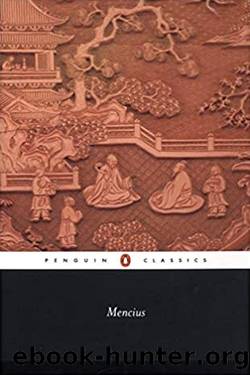Mencius by Mencius & D. C. Lau

Author:Mencius & D. C. Lau [Mencius & Lau, D. C.]
Language: eng
Format: epub
Tags: Ancient, Classical, China, Eastern, History & Surveys, Non-Fiction, Philosophy, Political
ISBN: 9780140449716
Google: YAyl5L_Xt6AC
Publisher: Penguin UK
Published: 2004-10-27T23:00:00+00:00
3. Wan Chang asked, ‘May I ask about friendship?’
‘In making friends with others,’ said Mencius, ‘do not rely on the advantage of age, position or powerful relations. In making friends with someone you do so because of his virtue, and you must not rely on any advantages you may possess.
‘Meng Hsien Tzu was a noble with a hundred chariots. He had five friends, including Yüeh-cheng Ch’iu and Mu Chung–the names of the other three I have forgotten. Hsien Tzu had these five as friends because they lacked his position. If these five had had his position, they would not have accepted him as a friend. This applies not only to a noble with a hundred chariots, but also to rulers of small states. Duke Hui of Pi said, “Tzu-ssu I treat as a teacher; Yen Pan I treat as a friend; as for Wang Shun and ch‘ang Hsi, they are men who serve me.” Not only does this apply to rulers of small states, but sometimes also to rulers of large states. Take Duke P’ing of Chin and Hai T’ang for instance. He entered when Hai T’ang said “Enter”, sat down when Hai T’ang said “Sit down”, and ate when Hai T’ang said “Eat”, and he ate his fill even when the fare was unpolished rice and vegetable broth, because he did not share do otherwise. But Duke P’ing went no further than this. He did not share with Hai T’ang his position, his duties, or his revenue–all given to him by Heaven. This is the honouring of the good and wise by a Gentleman, not the honouring of the good and wise by kings and dukes.
‘Shun went to see the Emperor, who placed his son-in-law in a separate mansion. He entertained Shun but also allowed himself to be entertained in return. This is an example of an Emperor making friends with a common man.
‘For an inferior to show deference to a superior is known as “honouring the honoured” for a superior to show deference to an inferior is known as “honouring the good and wise”. These two derive, in fact, from the same principle.’
Download
This site does not store any files on its server. We only index and link to content provided by other sites. Please contact the content providers to delete copyright contents if any and email us, we'll remove relevant links or contents immediately.
| Confucianism | Feng Shui |
| I Ching | Jainism |
| Karma | Shintoism |
| Sikhism | Tao Te Ching |
| Taoism | Tibetan Book of the Dead |
| Zoroastrianism |
The Tao of Physics by Fritjof Capra(1848)
The Diamond Cutter by Geshe Michael Roach(1671)
Feng Shui by Stephen Skinner(1616)
Human Design by Chetan Parkyn(1574)
The Alchemy of Sexual Energy by Mantak Chia(1490)
Tao Te Ching by Lao Tzu(1485)
365 Tao: Daily Meditations by Ming-Dao Deng(1301)
Tao Tantric Arts for Women by Minke de Vos(1260)
Sun Tzu's The Art of War by Giles Lionel Minford John Tzu Sun(1246)
Karma-Yoga and Bhakti-Yoga by Swami Vivekananda(1221)
Sidney Sheldon (1982) Master Of The Game by Sidney Sheldon(1187)
Buddhism 101 by Arnie Kozak(1185)
The Analects of Confucius by Burton Watson(1145)
The Art of War Other Classics of Eastern Philosophy by Sun Tzu Lao-Tzu Confucius Mencius(1141)
The New Bohemians Handbook by Justina Blakeney(1104)
Tao te ching by Lao Tzu(1077)
The Way of Chuang Tzu by Thomas Merton(1070)
The Sayings Of by Confucius(1027)
Bless This House by Donna Henes(990)
